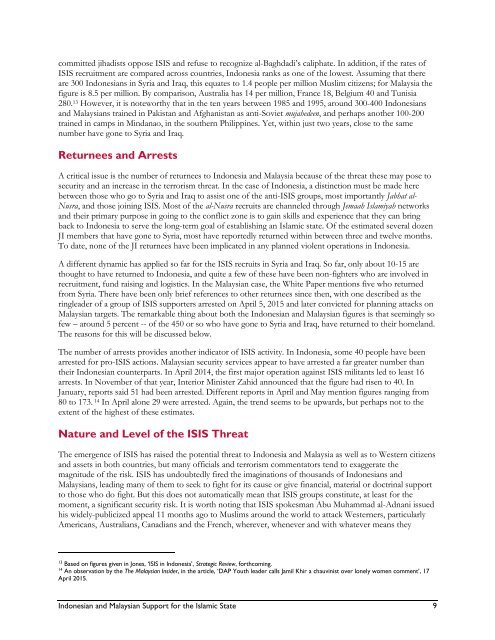INDONESIAN AND MALAYSIAN SUPPORT FOR THE ISLAMIC STATE (FINAL REPORT)
CVE_IndonesianMalaysianSupportforISIS
CVE_IndonesianMalaysianSupportforISIS
You also want an ePaper? Increase the reach of your titles
YUMPU automatically turns print PDFs into web optimized ePapers that Google loves.
committed jihadists oppose ISIS and refuse to recognize al-Baghdadi’s caliphate. In addition, if the rates of<br />
ISIS recruitment are compared across countries, Indonesia ranks as one of the lowest. Assuming that there<br />
are 300 Indonesians in Syria and Iraq, this equates to 1.4 people per million Muslim citizens; for Malaysia the<br />
figure is 8.5 per million. By comparison, Australia has 14 per million, France 18, Belgium 40 and Tunisia<br />
280. 13 However, it is noteworthy that in the ten years between 1985 and 1995, around 300-400 Indonesians<br />
and Malaysians trained in Pakistan and Afghanistan as anti-Soviet mujahedeen, and perhaps another 100-200<br />
trained in camps in Mindanao, in the southern Philippines. Yet, within just two years, close to the same<br />
number have gone to Syria and Iraq.<br />
Returnees and Arrests<br />
A critical issue is the number of returnees to Indonesia and Malaysia because of the threat these may pose to<br />
security and an increase in the terrorism threat. In the case of Indonesia, a distinction must be made here<br />
between those who go to Syria and Iraq to assist one of the anti-ISIS groups, most importantly Jabhat al-<br />
Nusra, and those joining ISIS. Most of the al-Nusra recruits are channeled through Jemaah Islamiyah networks<br />
and their primary purpose in going to the conflict zone is to gain skills and experience that they can bring<br />
back to Indonesia to serve the long-term goal of establishing an Islamic state. Of the estimated several dozen<br />
JI members that have gone to Syria, most have reportedly returned within between three and twelve months.<br />
To date, none of the JI returnees have been implicated in any planned violent operations in Indonesia.<br />
A different dynamic has applied so far for the ISIS recruits in Syria and Iraq. So far, only about 10-15 are<br />
thought to have returned to Indonesia, and quite a few of these have been non-fighters who are involved in<br />
recruitment, fund raising and logistics. In the Malaysian case, the White Paper mentions five who returned<br />
from Syria. There have been only brief references to other returnees since then, with one described as the<br />
ringleader of a group of ISIS supporters arrested on April 5, 2015 and later convicted for planning attacks on<br />
Malaysian targets. The remarkable thing about both the Indonesian and Malaysian figures is that seemingly so<br />
few – around 5 percent -- of the 450 or so who have gone to Syria and Iraq, have returned to their homeland.<br />
The reasons for this will be discussed below.<br />
The number of arrests provides another indicator of ISIS activity. In Indonesia, some 40 people have been<br />
arrested for pro-ISIS actions. Malaysian security services appear to have arrested a far greater number than<br />
their Indonesian counterparts. In April 2014, the first major operation against ISIS militants led to least 16<br />
arrests. In November of that year, Interior Minister Zahid announced that the figure had risen to 40. In<br />
January, reports said 51 had been arrested. Different reports in April and May mention figures ranging from<br />
80 to 173. 14 In April alone 29 were arrested. Again, the trend seems to be upwards, but perhaps not to the<br />
extent of the highest of these estimates.<br />
Nature and Level of the ISIS Threat<br />
The emergence of ISIS has raised the potential threat to Indonesia and Malaysia as well as to Western citizens<br />
and assets in both countries, but many officials and terrorism commentators tend to exaggerate the<br />
magnitude of the risk. ISIS has undoubtedly fired the imaginations of thousands of Indonesians and<br />
Malaysians, leading many of them to seek to fight for its cause or give financial, material or doctrinal support<br />
to those who do fight. But this does not automatically mean that ISIS groups constitute, at least for the<br />
moment, a significant security risk. It is worth noting that ISIS spokesman Abu Muhammad al-Adnani issued<br />
his widely-publicized appeal 11 months ago to Muslims around the world to attack Westerners, particularly<br />
Americans, Australians, Canadians and the French, wherever, whenever and with whatever means they<br />
13<br />
Based on figures given in Jones, ‘ISIS in Indonesia’, Strategic Review, forthcoming.<br />
14<br />
An observation by the The Malaysian Insider, in the article, ‘DAP Youth leader calls Jamil Khir a chauvinist over lonely women comment’, 17<br />
April 2015.<br />
Indonesian and Malaysian Support for the Islamic State 9


